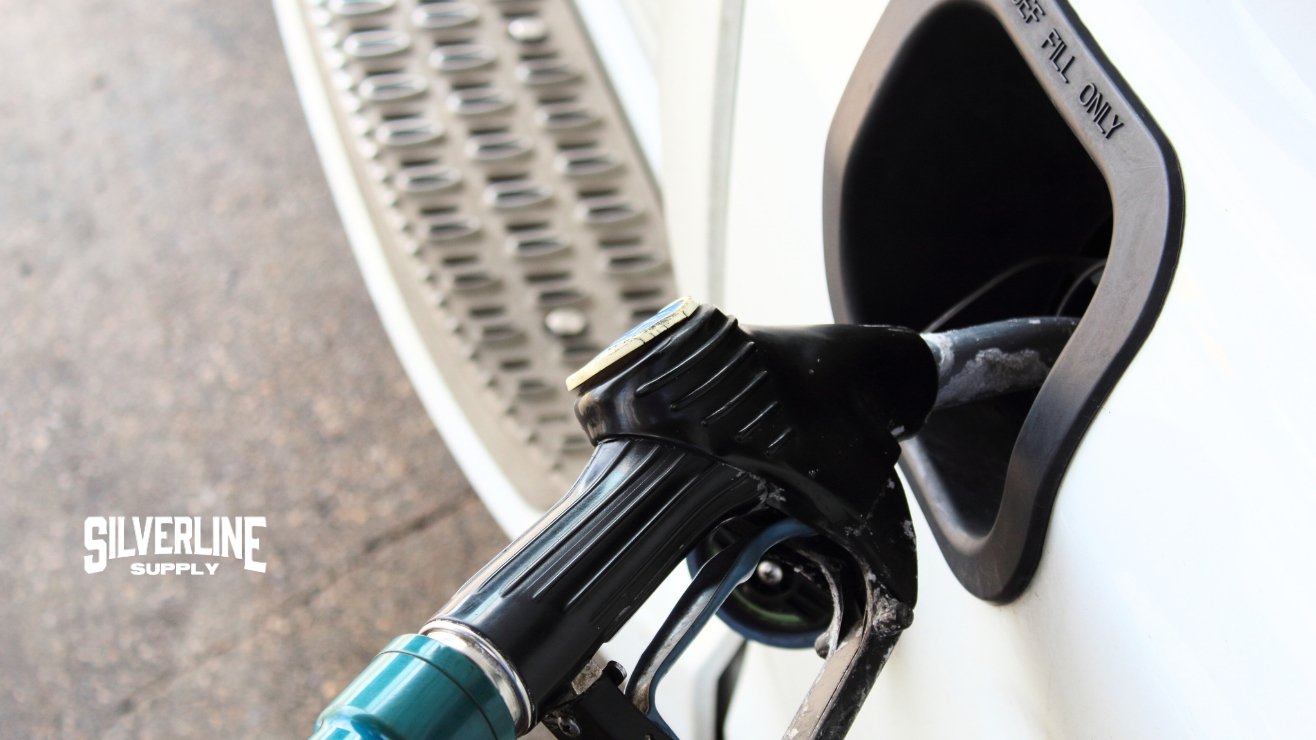Diesel Exhaust Fluid (DEF) has become an essential component in modern diesel engines, especially with the increasing focus on reducing vehicle emissions. This non-toxic, colorless fluid plays a crucial role in ensuring that diesel-powered vehicles comply with emissions standards, helping to reduce harmful nitrogen oxides (NOx) from entering the atmosphere.
Understanding what diesel exhaust fluid is and how to use it properly can significantly impact the performance of your equipment, reduce emissions, and keep your diesel engines running smoothly.
What is Diesel Exhaust Fluid?
Diesel exhaust fluid, commonly known as DEF, is a carefully formulated liquid used in the selective catalytic reduction (SCR) system of diesel engines. So, what is diesel exhaust fluid? It’s essentially a blend of purified water and urea, a compound derived from natural gas.
This fluid is not a fuel but it instead interacts later with the exhaust stream of diesel vehicles by getting injected to break down nitrogen oxide emissions. By doing so, it helps diesel engines meet stringent emissions control standards.
What is DEF Made Of?
If you’re wondering what is DEF made of, the answer is simple: DEF consists of a mixture of deionized water and urea, an organic compound. This combination helps create a solution that effectively reduces harmful NOx gases, which are known to contribute to air pollution and smog.
Here’s a closer look at the components to gain a better understanding of how diesel exhaust fluid makes this eco-conscious benefit possible:
1. Deionized Water (67.5%)
The bulk of DEF is purified water. This water is free from impurities that could interfere with the SCR system. Its main function is to act as a carrier for the urea, ensuring that the solution can be injected smoothly into the exhaust stream.
2. Urea (32.5%)
Urea, a nitrogen-rich compound commonly used in fertilizers, is the active ingredient in DEF. When DEF is added into the exhaust system by means of injection, the urea breaks down into ammonia (NH3) during the heat of the exhaust.
The ammonia then undergoes a reaction with the NOx in the SCR catalyst, that in turn converts it into just simple and safe nitrogen (N2) and vapor (H2O). This particular process makes it possible to reduce NOx emissions.
Indeed, it may seem simple, but its precise formulation is critical to its performance. The urea in DEF is a highly refined version of the compound typically found in fertilizers. When combined with purified water, this mixture is both safe and non-toxic. Additionally, DEF is stable and doesn’t pose a health hazard when handled properly.
One important consideration, however, is that DEF is not a fuel additive. It does not enter the engine but is injected into the exhaust stream after the combustion process. This makes what is DEF made of an essential part of ensuring diesel engines meet emissions standards without affecting engine performance.
The question is…how does it work? Let’s talk more about that in the next section.
How Does Diesel Exhaust Fluid Work?
In diesel engines equipped with a selective catalytic reduction (SCR) system, DEF is injected into the exhaust gases that leave the engine. These exhaust gases typically contain nitrogen oxides, which are harmful pollutants.
Once DEF is injected into the exhaust stream, it enters the SCR catalyst where it undergoes a chemical reaction. This reaction breaks down the nitrogen oxides into nitrogen and water vapor. The result is a significant reduction in the amount of pollutants released into the environment, making diesel vehicles more eco-friendly.
Now that you know what diesel exhaust fluid is, let’s explore the specifics of what DEF is made of and how it interacts with your vehicle.
Storing Diesel Exhaust Fluid: Best Practices
Storing DEF properly is essential to maintaining its efficacy. Since what is DEF made of includes water and urea, both elements are sensitive to temperature fluctuations. DEF should be stored between 32°F and 86°F to maintain its stability and prevent degradation. Prolonged exposure to extreme temperatures can affect the fluid’s ability to reduce emissions effectively.
Here are a few key tips for storing DEF:
- Keep DEF out of direct sunlight to avoid unwanted chemical changes.
- Store DEF in a plastic or stainless-steel container to prevent oxidation, as the alkalinity of DEF can cause rusting similar to how oxygen rusts steel.
- Make sure your storage containers are sealed to prevent contamination and maintain the fluid’s purity.
It’s important to note that DEF can freeze at temperatures below 32°F, but the fluid can still be used after thawing. To avoid freezing, ensure that your storage location stays within the recommended temperature range.
Using Diesel Exhaust Fluid: Key Considerations
One of the most critical aspects of using DEF is ensuring that you always have enough fluid in the DEF tank. Running out of DEF can have serious consequences for the performance of your diesel engine.
Most modern diesel vehicles come equipped with DEF tanks ranging in size from 15 to 50 gallons, depending on the size of the equipment. Additionally, DEF gauges are built into these vehicles to help operators monitor fluid levels.
When the DEF level drops below 10%, a series of warnings will appear to alert the operator. If the DEF tank falls below 5%, the engine’s power will be reduced, but it will still allow the vehicle to move a short distance so that more DEF can be added.
It’s recommended to fill the DEF tank for every three to four refuelings of diesel fuel, although this frequency may vary based on operating conditions.
Refilling the DEF Tank: What You Need to Know
Filling your DEF tank requires attention to detail, as DEF tanks are designed with specific safeguards to ensure that only the proper fluid is used. A DEF fill nozzle will only fit the opening of a DEF tank, preventing the accidental use of diesel fuel in the DEF system. This is crucial because introducing diesel fuel into the DEF tank can lead to severe engine damage.
Always keep an adequate supply of DEF on hand, especially if your equipment operates in remote locations. Running out of DEF can lead to downtime as your engine may stop functioning without the proper exhaust treatment in place. Staying on top of your DEF levels and knowing when to refill is key to maintaining optimal equipment performance.
Diesel Exhaust Fluid and the Environment
The use of DEF not only helps diesel engines meet emissions standards but also plays a vital role in protecting the environment. Nitrogen oxides (NOx) are significant contributors to air pollution, and diesel engines have historically been major sources of these harmful gases. By using DEF, diesel engines can reduce NOx emissions by up to 90%. This reduction helps improve air quality and reduces the environmental impact of diesel-powered vehicles and equipment.
Understanding what environmental benefits diesel exhaust fluid provides, will help you appreciate the importance of proper DEF usage. With growing concerns about climate change and air quality, DEF is an essential tool in reducing the harmful effects of diesel emissions.
Common Myths About Diesel Exhaust Fluid
Despite the widespread use of Diesel Exhaust Fluid (DEF), several myths persist that lead to misunderstandings about how it works and its impact on vehicles. Let’s address some of the most common misconceptions:
Myth: DEF is a Fuel Additive
A frequent misconception is that DEF is mixed directly with the diesel fuel. In reality, DEF is not a fuel additive. It never enters the engine or interacts with the fuel itself. Instead, DEF is stored in a separate tank and injected into the exhaust system. Its role is to chemically react with the nitrogen oxides (NOx) produced by combustion, converting them into harmless nitrogen and water.
Confusing DEF with a fuel additive can lead to improper use, which can cause serious damage to the vehicle’s emission system.
Myth: DEF Can Damage the Engine
Some believe that using DEF can harm the engine or negatively impact vehicle performance. This is false. DEF does not come into direct contact with the engine or any fuel system components.
It is solely injected into the exhaust stream, where it helps the vehicle’s selective catalytic reduction (SCR) system function properly. Far from damaging the engine, DEF plays a critical role in allowing modern diesel engines to meet stringent emissions standards, improving the environmental footprint of diesel-powered vehicles without compromising performance.
Myth: DEF is Hazardous or Dangerous to Handle
Another misconception is that DEF is a hazardous or toxic substance, leading to concerns about its handling. In fact, DEF is a non-toxic, non-hazardous solution made of 32.5% urea and 67.5% deionized water.
Urea, while a nitrogen-based compound, is commonly used in fertilizers and poses no threat when handled correctly. The fluid is stable, safe to touch, and does not produce harmful fumes. While you should avoid contamination of DEF with other chemicals, it poses no risk to personal safety when managed according to standard practices.
Diesel Exhaust Fluid’s Impact on Modern Diesel Engines
Diesel exhaust fluid (DEF) is a critical component in modern diesel engines, playing an essential role in reducing harmful nitrogen oxide emissions. Understanding what diesel exhaust fluid is and what DEF is made of will help you use it correctly and maintain the efficiency of your diesel-powered equipment. By following best practices for storing and using DEF, you can ensure that your diesel engines remain compliant with emissions regulations and continue to operate at peak performance.
With its simple composition of urea and purified water, DEF is non-toxic, environmentally friendly, and effective in breaking down pollutants. By embracing the use of DEF, diesel engine operators are doing their part to protect the environment while maintaining the reliability of their equipment.
Whether you’re working with heavy-duty machinery or everyday diesel vehicles, DEF will continue to be a key factor in meeting emissions standards and ensuring the longevity of your diesel-powered equipment. So, the next time you think about Diesel Exhaust Fluid, remember its vital role in keeping the air cleaner and your engines running smoothly.


